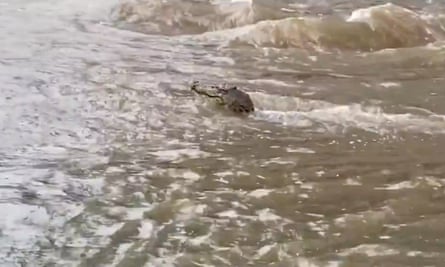As if a cyclone, record-breaking floods, power outages and water shortages weren’t enough, north Queensland communities are also having to deal with the threat of crocodiles popping up in unusual places.
Chloe Chomicki, an ABC reporter, on Monday captured video of a crocodile in a drain in Inghamand they’ve also been spotted in the Indigenous community of Wujal Wujal, where nine people spent the night huddled on the roof of the local hospital.
Peak Aussie content here 🐊 A big crocodile has been spotted in a swollen drain in the centre of Ingham, a North Queensland town currently cut off by floodwaters. Filmed by @abcnews reporter @ChloeChomicki, who is isolated like everyone else in town. pic.twitter.com/LSg5ODkpIF
— Siobhan Heanue (@siobhanheanue) December 17, 2023
Wujal Wujal resident Dallas Walker said the entire community was inundated by water overflowing from the Bloomfield River.
“[Town is] submerged in like, dirty water, debris just everywhere. There’s a lot of mud. And it’s croc-infested waters as well,” she said.

Wujal Wujal Aboriginal Shire council CEO Kiley Hanslow said there were crocodiles swimming through the main street of the town.
Several communities in the neighbouring Douglas Shire council are also underwater.
“When the water gets as high as what it’s getting there is the opportunity of crocodiles moving,” Hanslow said.
“And so there is a high risk [to] people when walking through water.”
Associate professor Sally Isberg, from the centre for Crocodile Research, said the animals try to avoid flood waters, preferring clear and calm water.
“Humans get swept out to sea in rip tides and get hurt going down rapids. It’s no different for crocodiles being in turbid waters so they just move into calmer waters whilst the flood waters are there,” she said.
Crocodiles normally take shelter at the bank of rivers where the current is weakest, she said.
The Queensland police commissioner, Katarina Carroll, encouraged north Queenslanders to be “incredibly careful about being in the water”.
“You would recall from past events we have found sharks, crocs and you name it,” she said.
after newsletter promotion
“The flooding is extraordinary up there.”
Isberg said to stick to the state government’s crocodile safety guidelines.
That means, no swimming, not hanging a hand or foot out of a boat, keeping five metres from the water’s edge and disposing of waste appropriately.
She said most north Queenslanders were sensible and knew the risks.
“There’s always going to be danger. If you approach a crocodile or if you do stupid stuff around crocodiles, there’s always going to be a danger there,” she said.
“But if … you are actively always aware that a crocodile is there, then you are pretty safe.
“Crocodiles are not mindless killing machines, they will only attack if they feel threatened.”
Isberg said crocodiles tend to know when flood waters are receding and will typically swim out of a flooded area to avoid becoming cut off, though some may walk back if they leave it too late.


